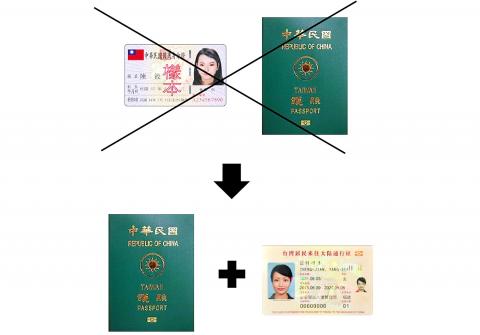UN demands that Taiwanese present China-issued documents to visit a public hearing at the UN’s offices in Geneva, Switzerland, are discriminatory and unacceptable, the Ministry of Foreign Affairs said yesterday.
“The UN claims to respect freedom for all, regardless of race, nationality, political or other identities... To serve the political purpose of a particular member nation goes against its mission,” the ministry said in a statement.
The statement came after a group of Taiwanese students were barred from observing a UN Human Rights Council (UNHRC) session in Geneva on Monday.

Photo: courtesy of National Chung Cheng University Department of Labor Relations professor Liuhuang Li-Chuan
The group, led by National Chung Cheng University Department of Labor Relations professor Liu Huang Li-chuan (劉黃麗娟), was first turned away earlier that day from the International Labour Conference, reportedly because their Republic of China passports are not recognized by the UN.
Liu Huang said UNHRC staff said that “Taiwan is not a country” and that the group would need to provide “Taiwan Compatriot Travel Documents” — a permit issued by Chinese authorities allowing Taiwanese to travel to China — with their passports to be admitted.
Liu Huang said she sought the assistance of UN Office at Geneva Director-General Michael Moller, who told her that nothing could be done, as “Taiwan is not following the ‘one China’ principle.”
“Was I speaking to a spokesman for China?” Liu Huang said on Facebook.
The UNHCR should provide everyone with the opportunity to learn about human rights, Liu Huang said, adding that the agency is apparently now “servicing the Chinese government.”
This is a serious situation, as China is using UN procedures to “achieve its dreams of unification by [forcing] the use of the Taiwan compatriot travel document,” Liu Huang said, adding that the government should beware of the extent of Beijing’s influence.
The ministry said its office in Geneva was aware of the incident and had expressed to the UN Office at Geneva that Taiwan “could not accept the discriminatory actions.”
The ministry criticized the UN as having gone against the universal values in its charter, saying that it would continue to protest the action, while asking nations friendly toward Taiwan to provide assistance.
A UN spokeswoman did not comment directly on the incident, but told reporters that visitors must present an identification document that is issued by “a country that is recognized as a state by the [UN] General Assembly.”
Additional reporting by AFP

CHAOS: Iranians took to the streets playing celebratory music after reports of Khamenei’s death on Saturday, while mourners also gathered in Tehran yesterday Iranian Supreme Leader Ayatollah Ali Khamenei was killed in a major attack on Iran launched by Israel and the US, throwing the future of the Islamic republic into doubt and raising the risk of regional instability. Iranian state television and the state-run IRNA news agency announced the 86-year-old’s death early yesterday. US President Donald Trump said it gave Iranians their “greatest chance” to “take back” their country. The announcements came after a joint US and Israeli aerial bombardment that targeted Iranian military and governmental sites. Trump said the “heavy and pinpoint bombing” would continue through the week or as long

TRUST: The KMT said it respected the US’ timing and considerations, and hoped it would continue to honor its commitments to helping Taiwan bolster its defenses and deterrence US President Donald Trump is delaying a multibillion-dollar arms sale to Taiwan to ensure his visit to Beijing is successful, a New York Times report said. The weapons sales package has stalled in the US Department of State, the report said, citing US officials it did not identify. The White House has told agencies not to push forward ahead of Trump’s meeting with Chinese President Xi Jinping (習近平), it said. The two last month held a phone call to discuss trade and geopolitical flashpoints ahead of the summit. Xi raised the Taiwan issue and urged the US to handle arms sales to

State-run CPC Corp, Taiwan (CPC, 台灣中油) yesterday said that it had confirmed on Saturday night with its liquefied natural gas (LNG) and crude oil suppliers that shipments are proceeding as scheduled and that domestic supplies remain unaffected. The CPC yesterday announced the gasoline and diesel prices will rise by NT$0.2 and NT$0.4 per liter, respectively, starting Monday, citing Middle East tensions and blizzards in the eastern United States. CPC also iterated it has been reducing the proportion of crude oil imports from the Middle East and diversifying its supply sources in the past few years in response to geopolitical risks, expanding

Pro-democracy media tycoon Jimmy Lai’s (黎智英) fraud conviction and prison sentence were yesterday overturned by a Hong Kong court, in a surprise legal decision that comes soon after Lai was jailed for 20 years on a separate national security charge. Judges Jeremy Poon (潘兆初), Anthea Pang (彭寶琴) and Derek Pang (彭偉昌) said in the judgement that they allowed the appeal from Lai, and another defendant in the case, to proceed, as a lower court judge had “erred.” “The Court of Appeal gave them leave to appeal against their conviction, allowed their appeals, quashed the convictions and set aside the sentences,” the judges